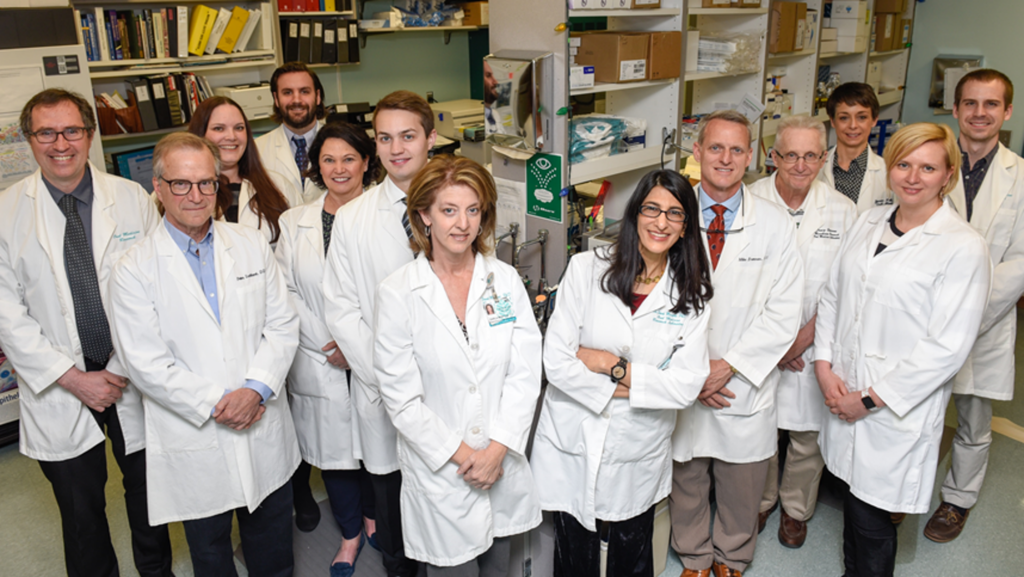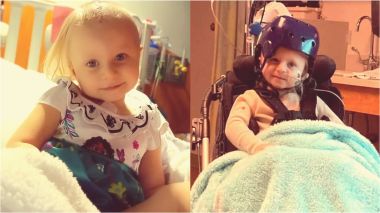When Benjamin Moeller, MD, prepares his head and neck cancer patients for radiation therapy, he prepares them for a tough journey ahead and offers his support. As a radiation oncologist with Atrium Health’s Levine Cancer Institute, Dr. Moeller tells patients about an unexpected part of this journey: the impact of radiation upon dental health.
Patients who receive radiation therapy for head and neck cancers become prone to dental problems. Radiation can decrease saliva production and alter oral flora – the balance of good bacteria and fungus – which can cause dental decay and cavities. A more serious problem that these patients can experience is osteoradionecrosis, which is bone death resulting from radiation.
The extent of dental issues varies, depending upon the dosage of radiation, existing dental problems and pre- and post-radiation dental care. For some patients, the risk is severe enough for doctors to advise them to have all teeth surgically extracted to prevent lifelong dental issues. This can negatively impact their quality of life, creating problems with speaking and eating, and possibly changing their appearance.
“Patients who need high doses of radiation treatment to the mouth, throat or neck are usually battling life-threatening cancers,” Dr. Moeller says. “Emotionally, it can be very difficult for patients to hear that, on top of all the other risks they are facing, their oral health is likely to be permanently impacted by their cancer treatment.”
Searching for the Risks to Improve the Outcomes
Currently, an Atrium Health study is examining the connection between dental problems and radiation therapy, hoping to decrease the prevalence of osteoradionecrosis and other dental problems in head and neck cancer patients. Michael Brennan, DDS, MHS, who works in oral medicine with Atrium Health, is a co-principal investigator of this study along with Rajesh Lalla, DDS, PhD, of the University of Connecticut. The study is funded by grants, totaling nearly $13 million, from the National Institute of Dental and Craniofacial Research (NIDCR), part of the National Institutes of Health (NIH). Patients have been enrolled at six clinical sites: Atrium Health, University of Connecticut, Brigham and Women’s Hospital, University of Pennsylvania, New York University, and University of North Carolina. The data coordinating center is at the University of Minnesota.
The first phase of the study, which has been completed, identified risk factors that lead to osteoradionecrosis. A second NIH grant has allowed the study to enter its second phase, as researchers follow 575 head and neck cancer patients for two years following their radiation therapy. Their goal is to better understand why oral problems result from radiation.
Some initial results have been surprising. For one, the study has shown a greater incident rate of osteoradionecrosis than the researchers expected. About 7 to 8 percent of head and neck cancer patients in the study had osteoradionecrosis. For patients who had tooth extractions prior to radiation, this rate increased to 12 percent.
The study has uncovered positive surprises, too, pinpointing risk factors that may lead to helpful interventions for patients to avoid these dental problems.
“Because of the findings from this rich data set we’ve put together, we can propose more interventional studies that will have a huge impact on the care of head and neck cancer patients,” Dr. Brennan says. “These findings will help us propose the right kind of interventional study that can help prevent these problems from happening.”
Among the findings is the power of proper dental hygiene. Following radiation therapy, head and neck cancer patients who brushed their teeth twice-a-day, flossed daily and regularly used prescription fluoride experienced far fewer dental problems. Surprisingly, this was true for both patients who had good dental hygiene prior to radiation as well as those who didn’t have good dental hygiene before radiation. The most important factor was the patient’s level of compliance following radiation therapy, giving hope to even those who begin their cancer treatment in poor dental health.
“We want to make sure that patients are on the right track,” Dr. Brennan says. “Once a problem starts, it can develop very quickly, but patients can prevent these problems from happening with the right information and long-term care from their dentists.”
A Supportive Team and Cutting-Edge Care
The Atrium Health study will continue to collect patient data through November 2019, and by November 2020, additional publications will be released based on the data. These findings will help other researchers begin new studies, but healthcare providers can already incorporate the preliminary findings in their patient care.
“These findings are unique and will really have an impact on care of our patients,” says Dr. Brennan. “Atrium Health and our study partners will be on the cutting edge of knowing how to prevent these problems from happening.”
Head and neck cancer patients at Levine Cancer Institute receive comprehensive care from a team of head and neck surgeons, radiation oncologists, medical oncologists, dentists, nutritionists, physical therapists, and speech and swallowing therapists. And as the study reveals more, these providers can include new, data-driven practices to protect patients’ dental health.
“The most important thing a patient can do to prepare for this battle is to make sure that they have the very best team in place to support them,” Dr. Moeller says. “Dr. Brennan’s commitment to research and patient care is a great example of the overall level of expertise available to our patients through this multidisciplinary care approach.”
Learn more about Atrium Health advancing medicine and dentistry through research and oral medicine care and services at Atrium Health, or call to make an appointment at 704-512-2110.



